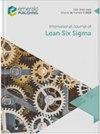Cognitive biases that influence Lean implementation and practices in a multicultural environment
IF 3.7
2区 工程技术
Q2 ENGINEERING, INDUSTRIAL
引用次数: 0
Abstract
Purpose The purpose of this paper is to highlight the prominent cognitive biases that influence Lean practices in organisations that have a multi-cultural work environment which will aid the organisational managers and academics in enhancing the understanding of the human thought process and mitigate them suitably. Design/methodology/approach A multiple case study was conducted in organisations that were previously committed to Lean practices and had a multi-cultural work environment. This research was conducted on five companies based on 99 in-depth semi-structured interviews and seven process observations that sought to establish the system-wide cognitive biases present in a multi-cultural Lean environment. Findings The novel findings indicate that nine new biases influence Lean implementation and practices in a multi-cultural environment. This study also found strong connectivity between Lean practices and 45 previously identified biases that could affect positively or negatively the lean methodologies and their implementation. Biases were resilient enough that their influence on Lean in multi-cultural workplaces, even with transient populations, did not demonstrate cultural differentiation. Research limitations/implications Like any qualitative research, constructivism and narrative analyses are subjected to understanding based on knowledge gained on the subject, and data may have been interpreted differently. Constructivist co-recreation of process scenarios based result limitations is therefore acknowledged. The interactive participation in exploring the knowledge sought after and interaction that could have a probable influence on the participant need to be acknowledged. However, the research design, multiple methods of data collection, generalisation based on data collection and analysis methods limit the effects of these and findings are reliable to a greater extent. Practical implications The results can provide an enhanced understanding of biases and insights into a new managerial approach to take remedial steps on biases’ influence on Lean practices that can result in improved productivity and well-being from a business process perspective. Understanding and mitigating the prominent biases can aid Lean manufacturing processes and support decision makers and line managers in improving lean methodologies’ effectiveness and productivity. The biases can be negated and used to implement decisions with ease. The influence of biases and the model could be used as a basis to counter implementation barriers. Originality/value To the best of the authors’ knowledge, this is the first study that connects the cognitive perspectives of Lean business processes in a multi-cultural environment to identify the cognitive biases that influence Lean practices in organisations that were previously committed to Lean practices. The novel findings indicate that nine new biases and 45 previously identified biases influence Lean implementation and practices in a multi-cultural environment. The second novelty of this study shows the connection between cognitive biases, Lean implementation and practices in multi-cultural business processes.在多元文化环境中影响精益实施和实践的认知偏见
本文的目的是强调在具有多元文化工作环境的组织中影响精益实践的突出认知偏差,这将有助于组织管理者和学者加强对人类思维过程的理解,并适当地减轻它们。设计/方法/方法在以前致力于精益实践并具有多元文化工作环境的组织中进行了多个案例研究。本研究对五家公司进行了99次深入的半结构化访谈和7次过程观察,旨在建立多元文化精益环境中存在的全系统认知偏差。新的研究结果表明,在多元文化环境中,有九种新的偏见影响着精益的实施和实践。本研究还发现,精益实践与45种先前确定的偏见之间存在很强的联系,这些偏见可能会对精益方法及其实施产生积极或消极的影响。偏见具有足够的弹性,在多元文化的工作场所,即使是在流动人口中,它们对精益的影响也没有表现出文化差异。像任何定性研究一样,建构主义和叙事分析是基于对主题所获得的知识来理解的,数据可能被不同地解释。因此,基于结果限制的过程场景的建构主义共同再造得到了认可。探索所追求的知识的互动参与和可能对参与者产生影响的互动需要得到承认。然而,研究设计、多种数据收集方法、基于数据收集的概括和分析方法限制了这些研究的效果,研究结果在更大程度上是可靠的。实际意义研究结果可以增强对偏见的理解,并为新的管理方法提供见解,以便对偏见对精益实践的影响采取补救措施,从而从业务流程的角度提高生产率和幸福感。理解和减轻突出的偏见可以帮助精益生产过程,并支持决策者和直线经理提高精益方法的有效性和生产率。偏见可以被否定,并用于轻松地执行决策。偏见和模型的影响可以作为消除实施障碍的基础。原创性/价值据作者所知,这是第一个将多元文化环境中精益业务流程的认知视角联系起来的研究,以确定在以前致力于精益实践的组织中影响精益实践的认知偏见。新的研究结果表明,在多元文化环境中,9种新的偏见和45种先前确定的偏见影响着精益的实施和实践。本研究的第二个新颖之处显示了认知偏差、精益实施和多元文化业务流程实践之间的联系。
本文章由计算机程序翻译,如有差异,请以英文原文为准。
求助全文
约1分钟内获得全文
求助全文
来源期刊

International Journal of Lean Six Sigma
Engineering-Industrial and Manufacturing Engineering
CiteScore
8.90
自引率
15.00%
发文量
46
期刊介绍:
Launched in 2010, International Journal of Lean Six Sigma publishes original, empirical and review papers, case studies and theoretical frameworks or models related to Lean and Six Sigma methodologies. High quality submissions are sought from academics, researchers, practitioners and leading management consultants from around the world. Research, case studies and examples can be cited from manufacturing, service and public sectors. This includes manufacturing, health, financial services, local government, education, professional services, IT Services, transport, etc.
 求助内容:
求助内容: 应助结果提醒方式:
应助结果提醒方式:


